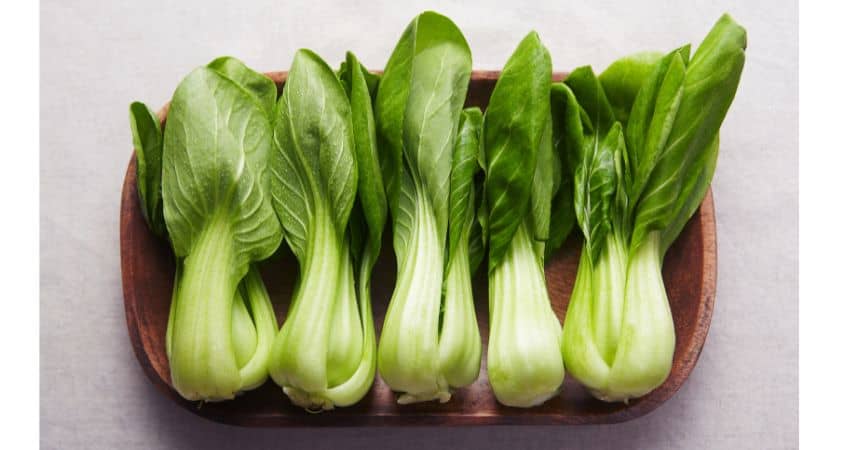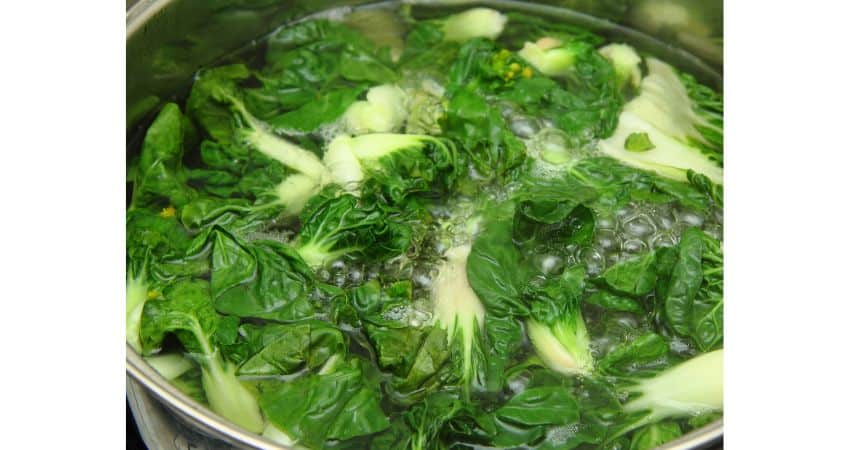How To Store Bok Choy
Storing Bok Choy can be tricky without performing the correct methods. Therefore, what is the best way to store Bok Choy?
To store Bok Choy for 3-4 days, place it unwashed into a perforated plastic bag and store it in the crisper drawer of the refrigerator. For longer-term storage, blanch the Bok Choy, dry it, place it into plastic freezer bags with the air removed and store in the freezer up to 12 months.
This article will discuss both methods in complete step-by-step detail. In addition, I’ll discuss additional methods which you may want to try like canning and dehydration. Therefore, no matter what method you choose, this article will cover all of them.
How To Store Bok Choy

As a Certified Health Coach many clients ask me about food storage including bok choy. Therefore, I have researched this topic in the past and present. I consume and store bok choy myself. Let’s examine the methods closely.
1. Refrigerate Bok Choy
Refrigerating Bok Choy unwashed is the best way to keep it fresh for short-term storage. Place it in a perforated plastic bag and store it in the refrigerator crisper drawer for 3-4 days.
How to refrigerate bok choy:
- Keep Bok Choy unwashed.
- Place it into a perforated plastic food storage bag.
- Place the plastic bag into the crisper draw of the refrigerator.
- Store up to 3-4 days.
Do not wash Bok Choy if you plan to use it within a few days of purchase1. Contact with water can cause mold on the leaves. Save the washing when it comes time to use it.
For longer-term storage, it will be washed which is covered in the next section about freezing.
Using perforated bags allows the air to circulate. Do not store it in the same draw as other vegetables or fruit which produce ethylene gas. Bok Choy is sensitive to the gas and exposure to it will speed up the spoiling process2.
The following are fruits and vegetables which produce ethylene gas:
- Apples
- Avocados
- Bananas
- Cantaloupe
- Kiwi
- Peaches
- Pears
- Peppers
- Tomatoes
Disclaimer: Some links in this article are affiliate links which means I may earn a small commission at no extra cost to you. As an Amazon associate I earn from qualifying purchases.
If you don’t have perforated bags, some people cut holes into a regular food storage bag which is fine. I’d rather use perforated bags which are available for purchase on Amazon. Check them out here, Perforated Food Storage Bags.
Store the Bok Choy away from any raw meat or meat juices to prevent cross-contamination3.
Another option4, but less popular, is to wrap it unwashed in damp paper towels and place it into a perforated plastic food storage bag5. The storing duration is the same, 3-4 days.
2. Freezing Bok Choy
Bok Choy needs to be washed when preparing it for frozen storage. Separate the stalks and rinse them and the leaves under running water to remove the dirt. Use a vegetable brush to remove stuck dirt.
It can be difficult to clean because of its thick leaves and the stalk area near the base6.
Follow these steps to wash Bok Choy:
- Slice a layer off the base of the vegetable.
- Separate the stalks.
- Rinse the stalks and leaves under running water.
- Use a vegetable brush to remove stubborn dirt which may be stuck.
How to freeze bok choy:
- Separate the stalks and wash under running water.
- Bring a pot of water to a boil.
- Fill a large bowl with ice water.
- Place the Bok Choy into the boiling water for two minutes.
- Immediately remove it and place it into the ice water.
- Once cool, remove and allow the leaves to dry completely.
- Place it into plastic freezer storage bags.
- Remove the excess air and seal the bag.
- Date the bag.
- Store in the freezer up to 12 months.
How about regular cooked cabbage, does it require the same methods? Find out in my article, How To Freeze Cooked Cabbage.
The best way to remove excess air from a plastic bag is to use a vacuum sealer. They are one of those items making you wonder how you did without one before purchasing it. Amazon has many affordable ones. Check out their current prices here, Vacuum Sealers.
Some people prefer freezing Bok Choy7 with a minimal amount of contact with water as possible. Water soaked leaves may start the spoiling process faster which makes some people wonder if you have to blanch it before freezing.
Bok Choy may be frozen without blanching. The leaves and stalks should be cleaned with damp paper towels and dried. It is placed into freezer bags and stored in the freezer up to 12 months.

How to freeze raw Bok Choy:
- Slice a layer off the base of the vegetable.
- Separate the stalks.
- Wipe the stalks and leaves with a damp paper towel to remove the dirt.
- Once clean dry it thoroughly.
- Cut the dried leaves into smaller pieces.
- Place the pieces into a plastic freezer bag.
- Remove the excess air and seal the top.
- Date the bag and store in the freezer up to 12 months.
How To Defrost
Defrost Bok Choy by transferring the frozen leaves from the freezer to the refrigerator. Keep it in the refrigerator until it is completely thawed ((Michigan State University: Cabbage and Chinese cabbage storage and preserving tips)).
3. Canning
Bok Choy can be stored long-term by canning. Canning involves heating jars of Bok Choy and sealing the tops. The heating process destroys microorganisms and enzymes which can cause it to spoil, change the color, flavor and texture.
How to can Bok Choy:
- Separate the stalks and wash under running water.
- Bring a pot of water to a boil.
- Fill a large bowl with ice water.
- Place the Bok Choy into the boiling water for two minutes.
- Immediately remove it and place it into the ice water.
- Once cool, remove it and transfer it to canning jars.
- Fill the jars with boiling water leaving one inch of space at the top.
- Close the jars with the lids and place them into the canner.
- Process a one-pint jar for 70 minutes at 11 pounds of pressure.
- Remove the jars and allow them to cool.
- Store the jars in a cool dry place up to 12 months.
If you’re interested in purchasing a canner, Amazon sells a wide variety of them at affordable prices. Check out some of the models here, Pressure Canners.
4. Dehydrating
Besides longer storage, dried vegetables are used for powder, chips, soups, snacks, salads and more. In addition, dehydrated vegetables maintain their nutrients and easy to store because they’re more compressed. The best way to dry vegetables is using a dehydrator.
How to dehydrate Bok Choy:
- Separate the stalks and wash under running water.
- Bring a pot of water to a boil.
- Fill a large bowl with ice water.
- Place the Bok Choy into the boiling water for two minutes.
- Immediately remove it and place it into the ice water.
- Once cool, remove the leaves and dry using a salad spinner and paper towels.
- Place it on the dehydrator trays.
- Set the dehydrator at 140 degrees Fahrenheit for 8-10 hours.
- Allow cooling for 45 minutes.
- Transfer the dried leaves to glass jars, airtight containers or plastic bags with excess air removed.
- Date the container and store up to 12 months.
Amazon sells a variety of food dehydrators. I recommend and use the best selling Cosori which comes with 50 free recipes. Check out the current price here, Cosori Food Dehydrator.
If you don’t have a food dehydrator, it can be dried in the oven. This process is not perfect because the oven doesn’t have the same air circulation as a dehydrator.
How to dehydrate Bok Choy in the oven:
- Separate the stalks and wash under running water.
- Bring a pot of water to a boil.
- Fill a large bowl with ice water.
- Place the Bok Choy into the boiling water for two minutes.
- Immediately remove it and place it into the ice water.
- Once cool, remove the leaves and dry using a salad spinner and paper towels.
- Place it on parchment paper lined baking sheets and spread them apart evenly.
- Preheat the oven to the lowest temperature.
- Place the baking sheets into the oven.
- Occasionally turn the leaves and stalks over and check for dryness.
- Once dry, remove the baking sheets from the oven and allow them to cool.
- Drying time depends on the oven temperature.
- Transfer the dried Bok Choy to storage containers and keep them in a cool place up to 12 months.
It’s important to spread the food around the baking sheet evenly and spread apart as much as possible.
5. Pickling
Pickling might be the tastiest way to preserve and store your Bok Choy for months.
How to pickle Bok Choy:
- Slice a layer off the base of the vegetable.
- Separate the stalks.
- Rinse and clean.
- Place them into the jar.
- Prepare the pickling brine. For each pound use one cup vinegar, 1/2 cup of water, one tablespoon of sugar and 1/2 tablespoon of salt.
- Simmer the brine for three minutes.
- Pour the brine into the jar containing the Bok Choy.
- Let the jar cool down and store it in the refrigerator up to six months.
6. Storing Cooked Bok Choy
All the above storage methods include uncooked8. What happens if you cook a delicious meal and have leftovers?
Cooked Bok Choy can be stored in the freezer up to five months and in the refrigerator for three days. Place the cooked Bok Choy into an airtight container and store it in the coldest area of the freezer or refrigerator.
How to refrigerate cooked Bok Choy:
- Within two hours of being cooked, place the Bok Choy into an airtight container or wrap tightly with plastic wrap.
- Place the container in the coldest area of the refrigerator.
How to freeze cooked Bok Choy:
- Within two hours of being cooked, place the Bok Choy into an airtight container or plastic freezer bag.
- Remove the excess air and seal.
- Date the container.
- Store in the freezer up to five months.
If it was prepared and mixed with other foods or sauces, those foods may have to be separated first. Depending on the food, the leftovers may have to be discarded.
If you have any questions to ask me about this article don’t hesitate to comment below or email us. You can find an email on our contact page.
Read Next – Food Storage Articles!
5 Tips on Storing Garlic Bread & More
How To Preserve and Store Peaches
- Glad: Bok Choy [↩]
- University of California, San Diego: Ethylene in Fruits and Vegetables [↩]
- Michigan State University: Michigan Fresh: Using, Storing, and Preserving Cabbage [↩]
- University of Arkansas: Try Bok Choy for a Different Vegetable [↩]
- University of Massachusetts Amherst: Bok Choy [↩]
- New Entry Sustainable Farming Project: Bok Choy [↩]
- University of Purdue: Bok Choy [↩]
- University of Minnesota: Growing Chinese cabbage and Bok Choy in home gardens [↩]
